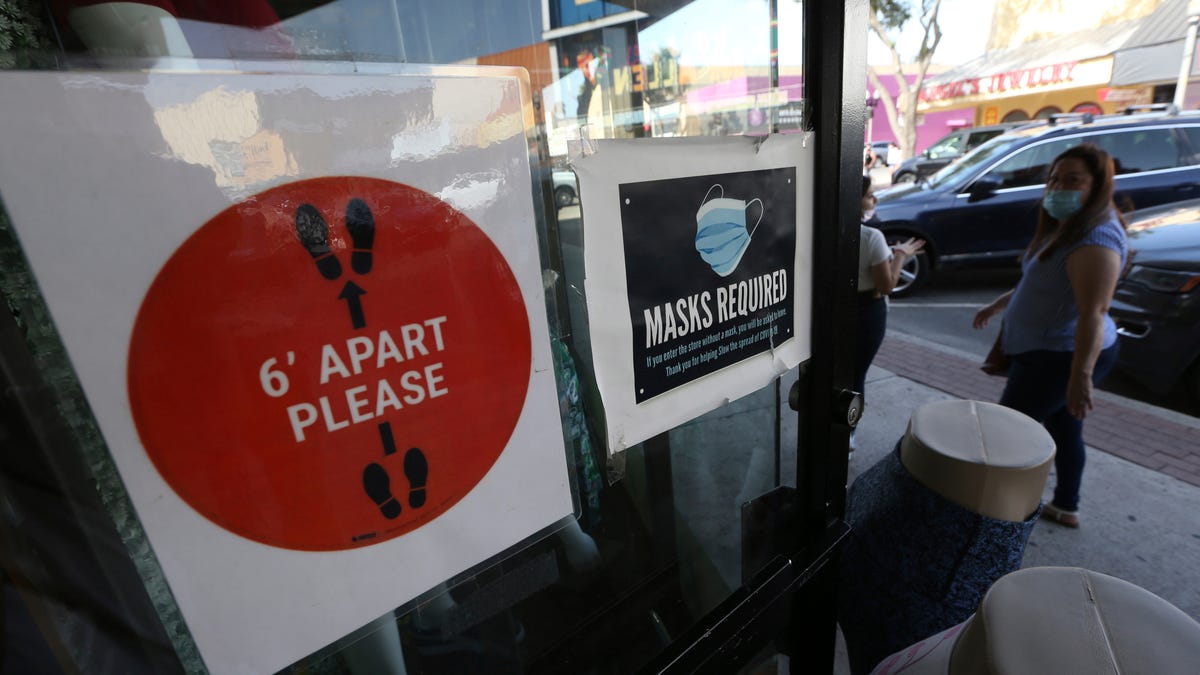Even though the Centers for Disease Control and Prevention said vaccinated individuals did not need to wear masks indoors two months ago, experts now are calling for people to “vax it and mask it.”
Los Angeles County this weekend mandated masks indoors, though the county sheriff announced he wouldn’t enforce it. Other California counties also recommended masks indoors. Arkansas, Missouri and New York are weighing mask mandates as cases spike in those states.
And the American Academy of Pediatrics issued recommendations Monday for the 2021-22 school year that include everyone older than 2 years of age wearing masks, regardless of vaccination status.
“Instead of vax it OR mask it, the emerging data suggest CDC should be advising to vax it and mask it in areas with (rising) cases and positivity until we see numbers going back down again,” former U.S. Surgeon General Dr. Jerome Adams said on Twitter.
The weekly rolling average for cases in the United States has nearly tripled in the last month. The pace of deaths also is up sharply — 24.7% from its low point two weeks ago.
CDC Director Dr. Rochelle Walensky said on NBC News that there may be contexts in which local officials need to make decisions different from national ones.
“There are areas of this country where about a third of people are vaccinated. They have low vaccination rates. And there are areas that have more disease,” Walensky said. “Those masking policies are not to protect the vaccinated, they’re to protect the unvaccinated.”
Also in the news:
►A White House official and an aide to House Speaker Nancy Pelosi, both fully vaccinated, have tested positive for the coronavirus after attending an event together.
►Costco will continue to hold special operating hours for members 60 and older and vulnerable shoppers, reducing them to two days a week.
►The U.S. upgraded its travel warnings for Britain, Indonesia and three other destinations, advising against visiting those countries because of surging coronavirus infections.
►Canada will reopen to fully vaccinated U.S. citizens and permanent residents starting Aug. 9.
►Officials in Spain are celebrating that half of the country’s population, or about 24 million people, have been fully vaccinated against COVID-19, although they say a sharp increase in infections is sending worrying numbers of patients into hospitals.
????Today’s numbers: The U.S. has had more than 34.1million confirmed COVID-19 cases and more than 609,000 deaths, according to Johns Hopkins University data. The global totals: More than 191 million cases and 4.1 million deaths. More than 161.4 million Americans — 48.6% of the population — have been fully vaccinated, according to the CDC.
????What we’re reading: At a time when the infection rate has doubled, many remain unvaccinated and the delta variant is vastly more contagious than the original, it’s important to recognize vaccines aren’t flawless.
Keep refreshing this page for the latest news. Want more? Sign up for USA TODAY’s Coronavirus Watch newsletter to receive updates directly to your inbox and join our Facebook group.
Survey: 78% of adults believe vaccines are effective
A new survey from the Annenberg Public Policy Center of the University of Pennsylvania reveals growing public confidence in the safety and effectiveness of COVID vaccines.
Out of the 1,719 U.S. adults surveyed, 78% believe it is definitely or probably true that vaccines are effective — an increase from 74% in April. Meanwhile, 76% of respondents believe it is definitely or probably true that it is safer to get the vaccine than to get COVID-19.
The survey also showed public trust in U.S. health authorities is holding steady, with 76% of respondents expressing confidence in the CDC and 68% in Dr. Anthony Fauci, the face of the country’s virus response.
But there’s good and bad news, Kathleen Hall Jamieson, director of the Annenberg Public Policy Center, said in a statement. The survey also found people who rely on conservative media are more likely to have less confidence in Fauci and in the vaccines, as well as more likely to believe misinformation about both.
“Those who trust health authorities are more likely to seek vaccination,” Jamieson said. “Deceptive messages that undermine trust in a health expert such as Dr. Fauci are deeply worrisome.”
Low vaccination rates, delta variant fuel surge in cases across the South
New cases linked to the highly infectious delta variant are on the rise and disproportionately affecting unvaccinated populations, creating a precarious situation across several Southern states. In many of these states, health workers continue to battle rampant vaccine hesitancy and misinformation that have resulted in some of the lowest vaccination rates in the country.
In the last two weeks, health officials across the region have issued warnings to alert the public about the prevalent spread of the delta variant, which is more contagious.
“It feels very reminiscent of where we were in an early part of the pandemic,” said Mississippi’s state epidemiologist Dr. Paul Byers. “It feels like we’re in the same situation now with the delta variant.” Read more here.
— Maria Clark, Melissa Brown and Sarah Haselhorst, The American South
Americans struggle to pay medical bills during pandemic
Americans had increasing difficulty paying their medical bills during the pandemic because of being infected with COVID-19, losing income or losing employer health insurance coverage, a new survey shows.
More than one-third of insured adults and half of uninsured adults said they had an issue paying for a medical bill. The national survey conducted by the Commonwealth Fund between March and June 2021 asked 5,450 working-age adults about how the pandemic affected their health insurance coverage and medical debt.
“They suffered ruined credit ratings. They were unable to afford basic life necessities like food, heat or their rent,” said lead author Dr. Sara Collins, Commonwealth Fund’s vice president for health care coverage, access and tracking.
This trend has become a chronic problem in the U.S. health system, she said. Read more here.
— Taylor Avery
These are the biggest COVID vaccine myths spreading online
Health officials say misinformation continues to hinder vaccination efforts, and they’re calling on social media companies to do more to address it.
“They’re killing people,” President Joe Biden said when asked by NBC News what his message is to platforms such as Facebook. “The only pandemic we have is among the unvaccinated. And they’re killing people.”
In a statement, Facebook said the company won’t be “distracted by accusations which aren’t supported by the facts.” Biden clarified Monday his comments were directed at those spreading falsehoods about the vaccine on social media platforms.
Health experts agree more needs to be done to combat misinformation online, and they debunked some of the biggest social media myths about the COVID-19 vaccines. Read more here.
— Adrianna Rodriguez
Former top aide accuses Boris Johnson of mishandling COVID-19 threat last year
Dominic Cummings, a former top aide to British Prime Minister Boris Johnson accused Johnson of dismissing the threat of COVID-19 last year.
Since leaving his job in November, Cummings has launched attacks on his former boss through blog posts, tweets and testimony to lawmakers, accusing Johnson of failing to act quickly against the coronavirus and causing thousands of unnecessary deaths.
The latest accusations came in a Tuesday BBC interview during which Cummings said Johnson’s attitude in fall 2020 “was a weird mix of, partly, ‘It’s all nonsense and lockdowns don’t work anyway,’ and partly, ‘Well this is terrible but the people who are dying are essentially all over 80 and we can’t kill the economy just because of people dying over 80.”’
Johnson’s office did not deny Cummings’ allegations but said “since the start of the pandemic, the prime minister has taken the necessary action to protect lives and livelihoods, guided by the best scientific advice.”
What to know about breakthrough infections
Breakthrough COVID cases — infections of those who are fully vaccinated — are rare but expected. The vaccines against the coronavirus are effective but not 100%.
According to the CDC, the effectiveness of the Pfizer and Moderna vaccines are 94-95% after the second shot, and the Johnson & Johnson vaccine was 66.3% effective at preventing infection. Even in a best-case scenario, that’s at least 5 out of every hundred vaccinated people potentially vulnerable to infection.
There is evidence that vaccination may make illness less severe in people who still get infected, according to the CDC. But with the delta variant now accounting for more than 80% of new infections in the U.S., some experts are encouraging even vaccinated people to wear a mask indoors while in public, especially in areas with low vaccination rates.
Read a full explainer on breakthrough infections.
— C.A. Bridges, Palm Beach Post
Why did the Dow drop 700 points Monday?
Resurgent pandemic worries knocked stocks lower from Wall Street to Tokyo on Monday, fueled by fears that faster spreading variants of the coronavirus may upend the economy’s strong recovery.
Increased worries about the virus may seem strange to people in parts of the world where masks are coming off, or already have, thanks to COVID-19 vaccinations.
But the World Health Organization said cases and deaths are climbing globally after a period of decline, spurred by the highly contagious delta variant. And given how tightly connected the global economy is, a hit anywhere can quickly affect others on the other side of the world. Read more here.
Contributing: The Associated Press.


Comment (0)